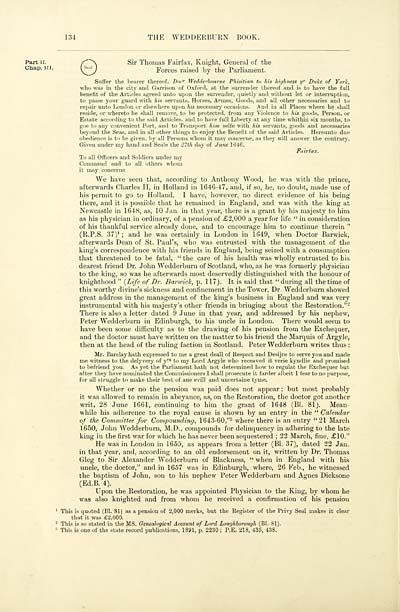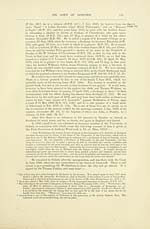Wedderburn book > History
(230) Page 134
Download files
Complete book:
Individual page:
Thumbnail gallery: Grid view | List view

134 THE WEDDERBURN BOOK.
Part ii. /"N Sir Thomas Fairfax, Knight, General of the
Chap. in. [s^J Forces raised by the p ar ii amellt .
Suffer the bearer thereof, Dorr Wedderbourne Phisitian to his highness y Duke of York,
who was in the city and Garrison of Oxford, at the surrender thereof and is to have the full
benefit of the Articles agreed uuto upon the surrender, quietly and without let or interruption,
to passe your guard with his servants, Horses, Annes, Goods, and all other necessaries and to
repair unto London or elsewhere upon his necessary occasions. And in all Places where he shall
reside, or whereto he shall remove, to be protected, from any Violence to his goods, Person, or
Estate according to the said Articles, and to have full Liberty at any time whithin six months, to
goe to any convenient Port, and to Transport him selfe with his servants, goods and necessaries
beyond the Seas, and in all other things to enjoy the Benefit of the said Articles. Hereunto due
obedience is to be given, by all Persons whom it may concerue, as they will answer the contrary.
Given under my hand and Seale the 27th day of June 1646.
Fa irfox.
To all Officers and Soldiers under my
Command and to all others whom
it may concerne.
We have seen that, according to Anthony Wood, he was with the prince,
afterwards Charles II, in Holland in 1646-47, and, if so, he, no doubt, made use of
his permit to go to Holland. I have, however, no direct evidence of his being
there, and it is possible that he remained in England, and was with the king at
Newcastle in 1648, as, 10 Jan. in that year, there is a grant by his majesty to him
as his physician in ordinary, of a pension of £2,000 a year for life " in consideration
of his thankful service already done, and to encourage him to continue therein "
(R.P.S. 37)'; and he was certainly in London in Ki49, when Doctor Barwick,
afterwards Dean of St. Paul's, who was entrusted with the management of the
king's correspondence with his friends in England, being seized with a consumption
that threatened to be fatal, "the care of his health was wholly entrusted to his
dearest friend Dr. John Wedderburn of Scotland, who, as he was formerly physician
to the king, so was he afterwards most deservedly distinguished with the honour of
knighthood " {Life of Dr. Barwick, p. 117). It is said that "during all the time of
this worthj' divine's sickness and confinement in the Tower, Dr. Wedderburn showed
great address in the management of the king's business in England and was very
instrumental with his majesty's other friends in bringing about the Restoration. "'-
There is also a letter dated 9 June in that year, and addressed by his nephew,
Peter Wedderburn in Edinburgh, to his uncle in London. There would seem to
have been some difficulty as to the drawing of his pension from the Exchequer,
and the doctor must have written on the matter to his friend the Marquis of Argylc,
then at the head of the ruling faction in Scotland. Peter Wedderburn writes thus :
Mr. Barclay hath expressed to me a great deall of Respect and Desijre to serve you and made
me witness to the delyvery of y vs to my Lord Argyle who receaved it verie kyndlie and promised
to befriend you. As yet the Parliament hath not determined how to regulat the Exchequer but
after they have nominated the Commissioners I shall prosecute it farder albeit I fear to no purpose,
for all struggle to make their best of ane evill and uncertaine tyme.
Whether or no the pension was paid does not appear ; but most probably
it was allowed to remain in abeyance, as, on the Restoration, the doctor got another
writ, 28 June 1661, continuing to him the grant of 1648 (Bl. 81). Mean-
while his adherence to the royal cause is shown by an entry in the " Calendar
of the Committee for Compounding, 1643-60," 3 where there is an entry "21 March
1650, John Wedderburn, M.D., compounds for delinquency in adhering to the late
king in the first war for which he has never been sequestered ; 22 March, fine, £10."
He was in London in 1655, as appears from a letter (Bl. 37), dated 22 Jan.
in that year, and, according to an old endorsement on it, written by Dr. Thomas
Gleg to Sir Alexander Wedderburn of Blackness, " when in England with his
uncle, the doctor," and in 1657 was in Edinburgh, where, 26 Keb., he witnessed
the baptism of John, son to his nephew Peter Wedderburn and Agnes Dicksone
(Ed.B. 4).
Upon the Restoration, he was appointed Physician to the King, by whom he
was also knighted and from whom he received a confirmation of his pension
1 This is quoted (Bl. 81) as a pension of 2,000 merks, but the Register of the Privy Seal makes it clear
that it was £2,000.
! This is so stated iu the MS. Genealogicil Account of Lord Loughborough (Bl. 81).
;: This is one of the state record publications, 1891, p. 2230 ; P.E. 218, 435, 438.
Part ii. /"N Sir Thomas Fairfax, Knight, General of the
Chap. in. [s^J Forces raised by the p ar ii amellt .
Suffer the bearer thereof, Dorr Wedderbourne Phisitian to his highness y Duke of York,
who was in the city and Garrison of Oxford, at the surrender thereof and is to have the full
benefit of the Articles agreed uuto upon the surrender, quietly and without let or interruption,
to passe your guard with his servants, Horses, Annes, Goods, and all other necessaries and to
repair unto London or elsewhere upon his necessary occasions. And in all Places where he shall
reside, or whereto he shall remove, to be protected, from any Violence to his goods, Person, or
Estate according to the said Articles, and to have full Liberty at any time whithin six months, to
goe to any convenient Port, and to Transport him selfe with his servants, goods and necessaries
beyond the Seas, and in all other things to enjoy the Benefit of the said Articles. Hereunto due
obedience is to be given, by all Persons whom it may concerue, as they will answer the contrary.
Given under my hand and Seale the 27th day of June 1646.
Fa irfox.
To all Officers and Soldiers under my
Command and to all others whom
it may concerne.
We have seen that, according to Anthony Wood, he was with the prince,
afterwards Charles II, in Holland in 1646-47, and, if so, he, no doubt, made use of
his permit to go to Holland. I have, however, no direct evidence of his being
there, and it is possible that he remained in England, and was with the king at
Newcastle in 1648, as, 10 Jan. in that year, there is a grant by his majesty to him
as his physician in ordinary, of a pension of £2,000 a year for life " in consideration
of his thankful service already done, and to encourage him to continue therein "
(R.P.S. 37)'; and he was certainly in London in Ki49, when Doctor Barwick,
afterwards Dean of St. Paul's, who was entrusted with the management of the
king's correspondence with his friends in England, being seized with a consumption
that threatened to be fatal, "the care of his health was wholly entrusted to his
dearest friend Dr. John Wedderburn of Scotland, who, as he was formerly physician
to the king, so was he afterwards most deservedly distinguished with the honour of
knighthood " {Life of Dr. Barwick, p. 117). It is said that "during all the time of
this worthj' divine's sickness and confinement in the Tower, Dr. Wedderburn showed
great address in the management of the king's business in England and was very
instrumental with his majesty's other friends in bringing about the Restoration. "'-
There is also a letter dated 9 June in that year, and addressed by his nephew,
Peter Wedderburn in Edinburgh, to his uncle in London. There would seem to
have been some difficulty as to the drawing of his pension from the Exchequer,
and the doctor must have written on the matter to his friend the Marquis of Argylc,
then at the head of the ruling faction in Scotland. Peter Wedderburn writes thus :
Mr. Barclay hath expressed to me a great deall of Respect and Desijre to serve you and made
me witness to the delyvery of y vs to my Lord Argyle who receaved it verie kyndlie and promised
to befriend you. As yet the Parliament hath not determined how to regulat the Exchequer but
after they have nominated the Commissioners I shall prosecute it farder albeit I fear to no purpose,
for all struggle to make their best of ane evill and uncertaine tyme.
Whether or no the pension was paid does not appear ; but most probably
it was allowed to remain in abeyance, as, on the Restoration, the doctor got another
writ, 28 June 1661, continuing to him the grant of 1648 (Bl. 81). Mean-
while his adherence to the royal cause is shown by an entry in the " Calendar
of the Committee for Compounding, 1643-60," 3 where there is an entry "21 March
1650, John Wedderburn, M.D., compounds for delinquency in adhering to the late
king in the first war for which he has never been sequestered ; 22 March, fine, £10."
He was in London in 1655, as appears from a letter (Bl. 37), dated 22 Jan.
in that year, and, according to an old endorsement on it, written by Dr. Thomas
Gleg to Sir Alexander Wedderburn of Blackness, " when in England with his
uncle, the doctor," and in 1657 was in Edinburgh, where, 26 Keb., he witnessed
the baptism of John, son to his nephew Peter Wedderburn and Agnes Dicksone
(Ed.B. 4).
Upon the Restoration, he was appointed Physician to the King, by whom he
was also knighted and from whom he received a confirmation of his pension
1 This is quoted (Bl. 81) as a pension of 2,000 merks, but the Register of the Privy Seal makes it clear
that it was £2,000.
! This is so stated iu the MS. Genealogicil Account of Lord Loughborough (Bl. 81).
;: This is one of the state record publications, 1891, p. 2230 ; P.E. 218, 435, 438.
Set display mode to:
![]() Universal Viewer |
Universal Viewer | ![]() Mirador |
Large image | Transcription
Mirador |
Large image | Transcription
Images and transcriptions on this page, including medium image downloads, may be used under the Creative Commons Attribution 4.0 International Licence unless otherwise stated. ![]()
| Histories of Scottish families > Wedderburn book > History > (230) Page 134 |
|---|
| Permanent URL | https://digital.nls.uk/95653479 |
|---|
| Attribution and copyright: |
|
|---|---|
| Description | A selection of almost 400 printed items relating to the history of Scottish families, mostly dating from the 19th and early 20th centuries. Includes memoirs, genealogies and clan histories, with a few produced by emigrant families. The earliest family history goes back to AD 916. |
|---|

